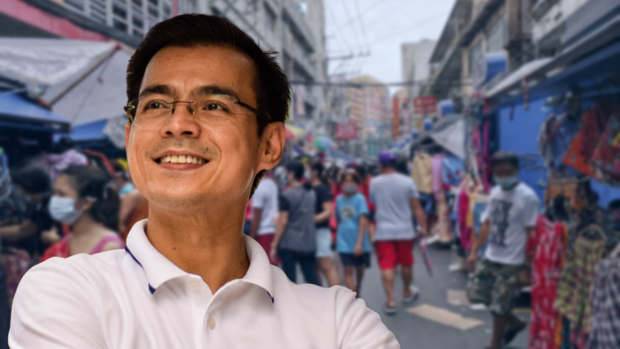Team Isko: It will still be a three-way race

Manila Mayor Francisco “Isko Moreno” Domagoso (INQUIRER.net file photo)
MANILA, Philippines — The camp of Manila Mayor Francisco “Isko Moreno” Domagoso on Wednesday objected to observations that the presidential election might be turning into a two-way race between former Sen. Ferdinand Marcos Jr. and Vice President Leni Robredo based on the results of Pulse Asia’s latest survey.
“It’s actually an unfair characterization that it will be a two-way fight. On the contrary, it will be a three-way race as evidenced by Mayor Isko being the top second choice,” Aksyon Demokratiko chair Ernesto Ramel Jr. told reporters in a Viber group.
He was reacting to a Pulse Asia executive’s remark in a cable news interview suggesting that the race could be down to Marcos, who dropped 4 percentage points from the previous survey to 56 percent, and Robredo, whose rating surged by 9 points to 24 percent.
“That’s her interpretation of their own survey,” Ramel said of Pulse Asia’s executive director Ana Maria Tabunda’s comments on ANC.
While Domagoso was a far third with 8 percent, he was the top second choice of voters with 23 percent of respondents saying they would pick him if their preferred candidate withdrew from the race.
Article continues after this advertisementHe said the Domagoso camp would release the results of a commissioned survey in the next few days to show that the mayor had the greatest odds of a come-from-behind victory.
Article continues after this advertisement“By Friday, we will discuss before the media a more recent survey done a few days ago that shows it will be a three-corner contest. With Mayor Isko having the best possibility to increase his numbers as the election draws near,” he said.
‘Color blind’
In Pagadian City, the Aksyon Demokratiko standard-bearer appealed to voters to consider him as an alternative, noting that the acrimony between the camps of Marcos and Robredo was becoming more heated.
“I notice the war between reds and yellows is becoming hotter and hotter and becoming more personal… It hasn’t changed, the war between the reds and yellows. And it won’t change if either of them wins. Still exacting revenge, still fighting each other,” Domagoso said.
“I have no quarrel with reds or yellows. I can work with anybody. When it comes to the government I’m color blind. As long as you’re good, I’ll take you in, even if you didn’t vote for me, as long as the people will benefit,” he said.
Presidential aspirant Sen. Panfilo Lacson and his running mate, Senate President Vicente Sotto III, also said on Wednesday that popularity surveys should not be given too much weight as these were not reflecting the level of support candidates feel on the campaign trail.
In a talk with reporters, Lacson played down the latest Pulse Asia survey results, which showed him trailing four other presidential contenders.
“I’m not disturbed [by] the surveys. Like what we have been saying all along, this is not what we are seeing in the rallies that we have been conducting, as well as the direct engagement with the people. We’ll stick to that,” he said.
Lacson, however, admitted he was baffled why the kind of warm response he and his running mate have been getting in their campaign sorties has not been mirrored by survey results.
Mind-conditioning
“This is why we want to put that message across since many—and we have heard this countless times on the ground—that they believe we are the right choice, but are wary that we may not win (as indicated by surveys),” he said.
“That should not be the mindset. It should be: ‘he is my choice, and I will vote for him, and that vote will not be wasted,” Lacson added.
The senator cited the “pleasantly surprising” response that they have been getting even in areas where they were not expected to be strong, the latest of which was Bohol province on Tuesday.
“In Bohol, no local officials have endorsed our candidacies, but when we entered the provincial capitol, we were surprised because we did not expect that kind of warm reception, which, we believe, is not staged,” he said.
Sotto said he was also skeptical of the survey results as he noted the “big difference” between what comes out in surveys and what they see on the ground.
“Let’s wait for other figures than just one or two survey companies, because what seems to be happening now — we would like to believe — is mind-conditioning. That is not good,” he said.
RELATE STORY